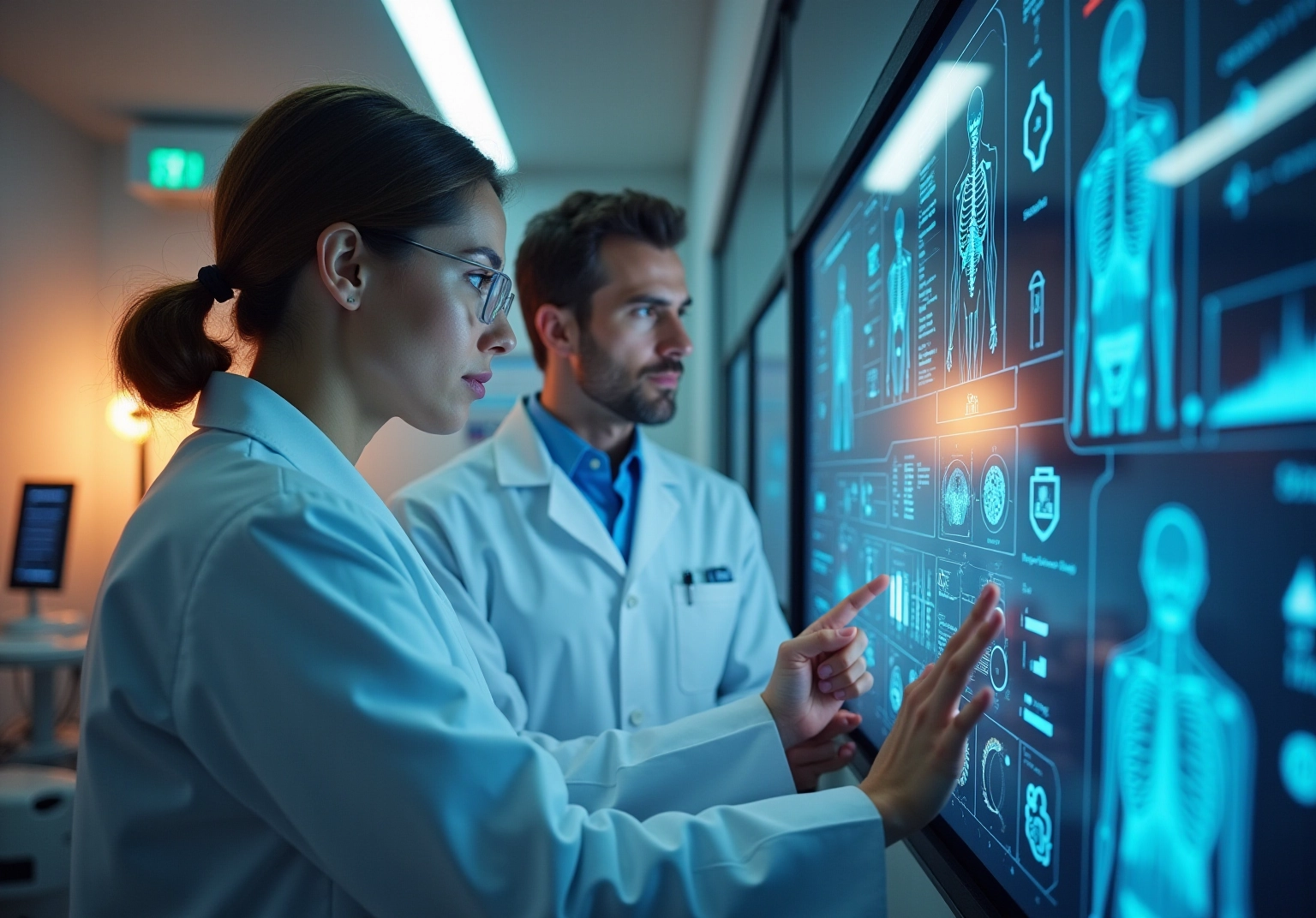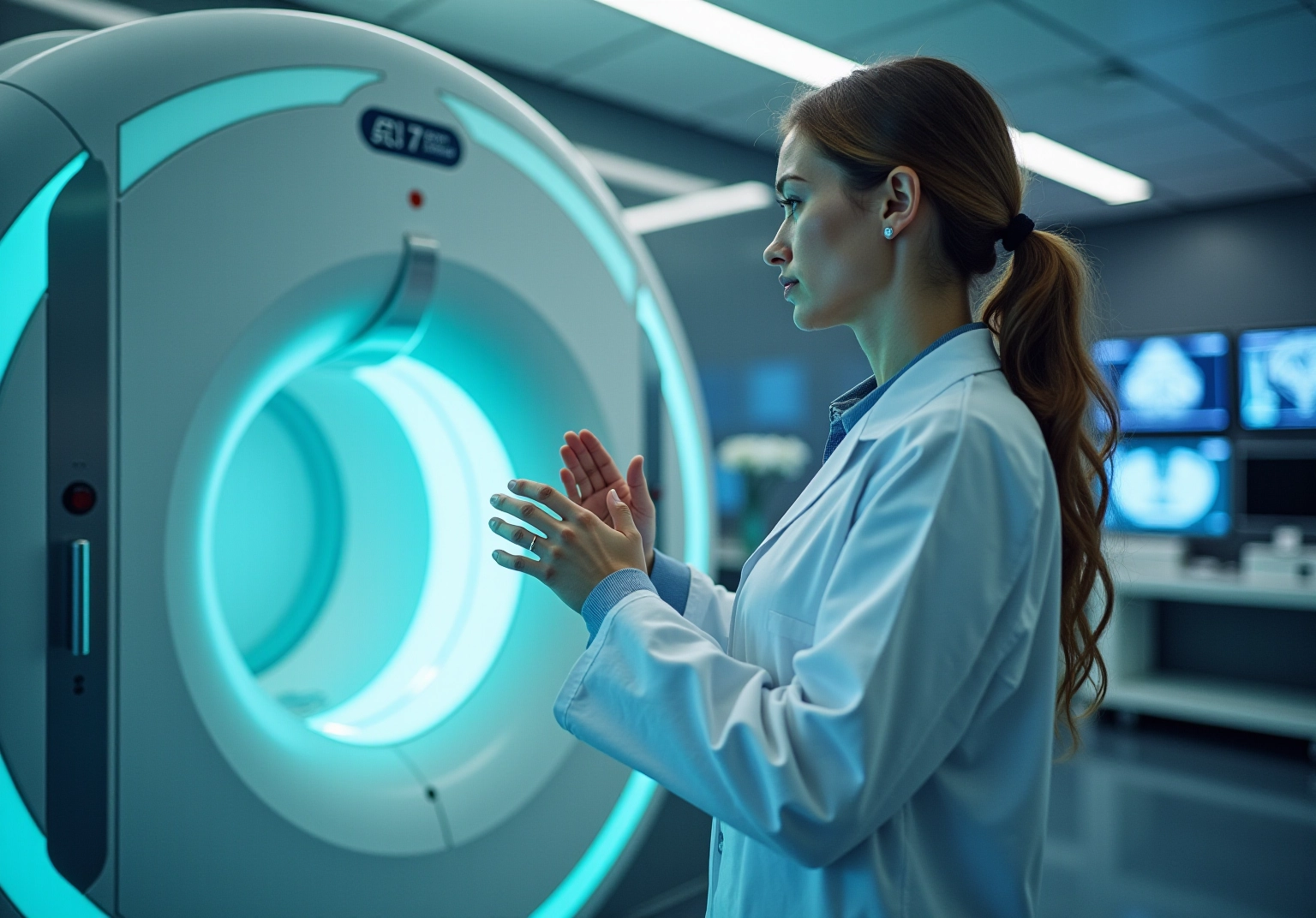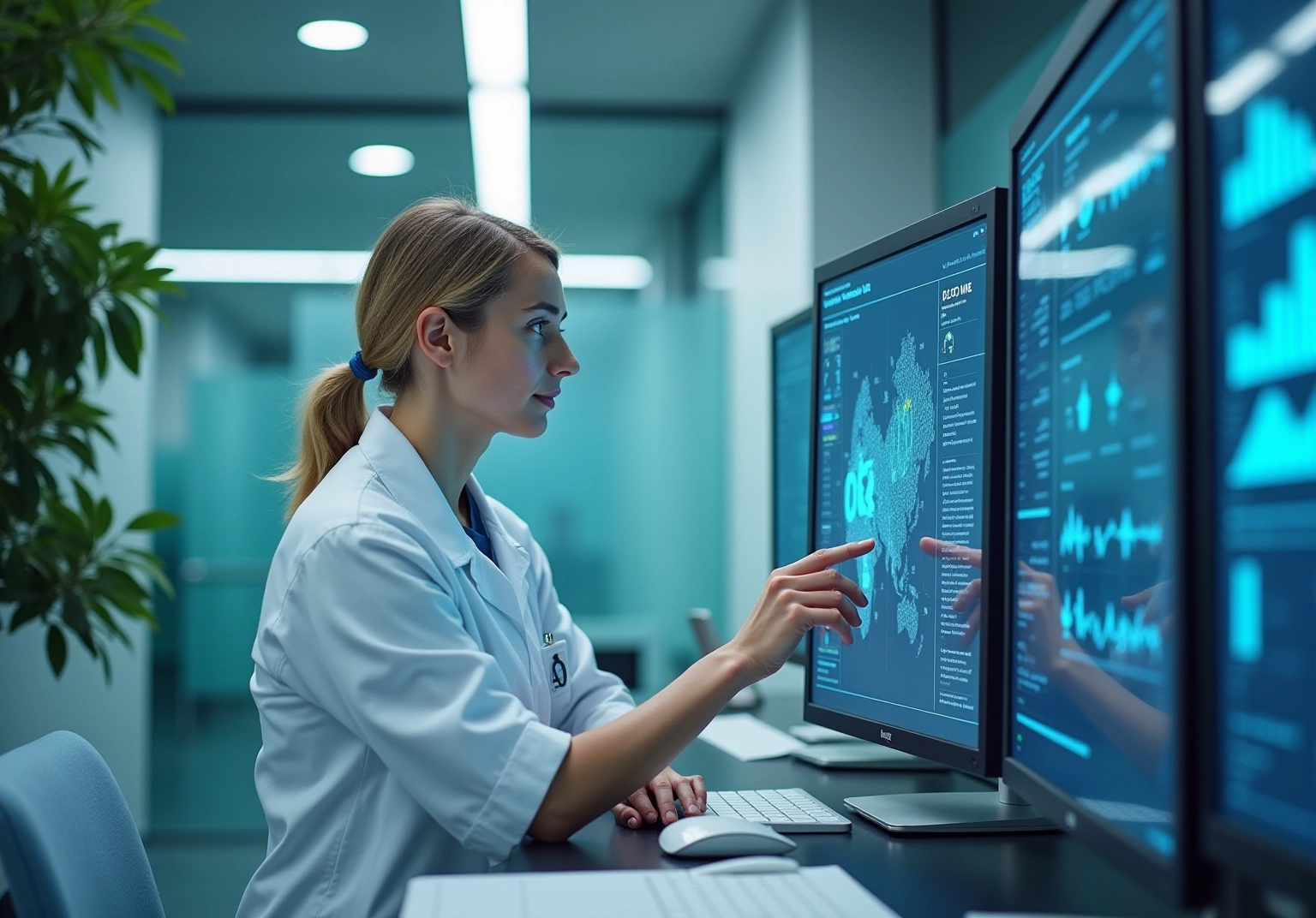
The article titled “10 Ways AI in Healthcare Industry Enhances Patient Care Efficiency” delves into the transformative role of artificial intelligence (AI) technologies in improving patient care efficiency within the healthcare sector. It outlines various applications of AI, including:
These innovations collectively streamline workflows, alleviate administrative burdens, and ultimately empower healthcare professionals to devote more time to patient care.
In the rapidly evolving landscape of healthcare, artificial intelligence (AI) is emerging as a transformative force, reshaping how patient care is delivered and managed. This technology is not just a passing trend; it is revolutionizing the sector. From optimizing administrative workflows to enhancing diagnostic accuracy, AI technologies are streamlining processes and improving outcomes across the board. Notable innovations, such as the Inferscience HCC Assistant and tools developed by industry leaders like Google Health and Amazon Web Services, are addressing critical care gaps while significantly boosting operational efficiency.
As healthcare providers navigate the complexities of risk adjustment, compliance, and personalized treatment strategies, the integration of AI stands out as a key driver for enhancing patient engagement and maximizing resources. This article delves into the latest advancements in AI within the healthcare sector, highlighting how these technologies are revolutionizing patient management and paving the way for a more efficient and effective healthcare system.
The Inferscience HCC Assistant addresses a critical challenge in healthcare: the overwhelming administrative burden of clinical data coding. Leveraging cutting-edge AI in the healthcare industry and natural language processing, it automates the collection and analysis of clinical data, performing real-time gap analysis on claims files to identify HCC codes that may have been overlooked. By providing coding recommendations at the moment of treatment, this innovative tool significantly alleviates the administrative load for medical professionals, allowing them to focus more on patient care.
Not only does the Inferscience HCC Assistant enhance coding accuracy, but it also empowers organizations to optimize their Risk Adjustment Factor (RAF) scores. This optimization leads to increased funding from Medicare Advantage contracts, directly impacting the financial health of healthcare providers. Its seamless integration within electronic health records (EHRs) streamlines workflows and unifies individual data, creating a more efficient environment for medical professionals.
As highlighted by medical professionals, the automation of HCC coding through this tool has transformed their practice. They can now engage fully with the patients they serve while ensuring compliance and maximizing revenue opportunities. In an era where efficiency and accuracy are paramount, the Inferscience HCC Assistant stands out as a vital resource for healthcare organizations aiming to improve their coding processes and financial outcomes through the application of AI in the healthcare industry.
The organization leverages advanced tools, including AI in the healthcare industry and natural language processing (NLP), to analyze extensive volumes of client data, such as medical history and genetic information, ultimately crafting personalized treatment plans. This capability empowers medical professionals to tailor interventions to individual needs, thereby enhancing treatment efficacy. By integrating AI in the healthcare industry into clinical workflows, the company not only improves outcomes for individuals but also supports providers in making informed decisions that adhere to regulatory standards and reimbursement strategies. The role of AI in the healthcare industry is pivotal in addressing compliance challenges and minimizing missed diagnoses, serving as an indispensable asset for professionals. Inferscience’s solutions streamline risk adjustment workflows, enhance HCC coding accuracy, and consolidate individual data, effectively maximizing Medicare reimbursements. Practical applications, such as remote monitoring of patients, have demonstrated the potential of AI in the healthcare industry to reduce hospital readmission rates by 45% for heart failure cases, underscoring its effectiveness in improving management and curtailing medical costs. As AI in the healthcare industry continues to evolve, its influence in personalized medicine is set to expand, solidifying its status as a vital resource in the medical domain.

Google Health is at the forefront of leveraging AI to significantly enhance diagnostic accuracy. By employing sophisticated machine learning algorithms, the organization meticulously analyzes medical images and individual data, facilitating the detection of diseases at much earlier stages. This innovative approach not only empowers clinicians to make more precise diagnoses but also minimizes the risk of misdiagnosis, which can lead to costly and unnecessary treatments.
In 2025, studies indicate that AI-driven diagnostic tools have improved accuracy rates by up to 30%, underscoring the transformative potential of these technologies in clinical settings. Furthermore, the integration of AI in diagnostics aids medical practitioners in adhering to compliance standards while simultaneously enhancing the quality of care for patients.
Real-world applications of AI in the healthcare industry, especially in medical imaging, have demonstrated remarkable success, with case studies revealing significant reductions in diagnostic errors and improved patient outcomes. As the medical landscape continues to evolve, the role of AI innovations by Google Health remains crucial in shaping a more efficient and effective healthcare system.
This platform leverages AI in the healthcare industry to optimize administrative processes, significantly reducing the time medical professionals allocate to non-clinical tasks. By integrating advanced NLP tools, the company consolidates healthcare data, streamlining HCC coding workflows and enhancing operational efficiency.
Accurate HCC coding is essential for medical professionals aiming to improve their RAF scores; the company’s solutions effectively address this critical need. Consequently, medical professionals can dedicate more time to patient care, ultimately elevating the quality of services provided. The integration of AI within the organization’s systems also ensures compliance with medical regulations, further supporting providers in achieving their operational goals.
Notably, 91% of respondents from athenahealth expressed the necessity for assurance that GenAI-sourced materials are developed by doctors and medical experts prior to their application in clinical decisions, highlighting the paramount importance of trust in AI solutions.
Moreover, the complexities surrounding funding and reimbursement for AI technologies present challenges that CFOs must adeptly navigate when contemplating their implementation. While AI enhances efficiency, it is imperative to balance this advancement with the human element, as 43% of Americans still prefer human interaction in medical settings.
Real-world examples of AI in the healthcare industry, particularly in medical billing and coding, further underscore the practical applications of the company’s solutions, illustrating their relevance to the target audience.
The organization harnesses the power of predictive analytics to enable proactive healthcare by meticulously analyzing historical data to anticipate potential health issues. This innovative approach empowers medical providers to identify at-risk individuals, facilitating timely interventions that can prevent complications. By leveraging insights from AI in the healthcare industry, Inferscience significantly amplifies the capabilities of medical organizations in managing patient populations, particularly through advanced HCC coding and risk adjustment processes. This results in improved health outcomes and a decrease in costs associated with emergency care and hospitalizations.
In fact, the AI in healthcare industry is projected to save U.S. medical services $150 billion annually by 2026, underscoring the financial benefits of predictive analytics. Furthermore, venture capital investments in smart medical startups reached $9.8 billion in 2023, signaling a robust growth trajectory in the predictive analytics market for healthcare. Consequently, organizations that adopt predictive analytics and NLP solutions are well-positioned to capitalize on these trends, ensuring they remain leaders in proactive patient management.
According to the case study titled ‘U.S. Healthcare Predictive Analytics Market Trends,’ government support and rising expenditures in the medical sector are expected to further stimulate market growth in the U.S. This positions Inferscience as a pivotal player in the evolving landscape of medical technology. As TJ Elbert, Chief Data Officer and General Manager of the Data Platform Business Unit, remarked, ‘I do not doubt that Ignite’s cutting-edge, adaptable, cloud-based ecosystem can seize this chance.
Amazon Web Services (AWS) is revolutionizing drug discovery by leveraging AI technologies to analyze extensive datasets and identify potential drug candidates with unprecedented efficiency. By streamlining the research and development process, AWS empowers pharmaceutical companies to expedite the introduction of new treatments to the market. This acceleration not only enhances patient access to innovative therapies but also significantly reduces the overall costs associated with drug development, aligning with the financial objectives of healthcare organizations.
In the wake of the COVID pandemic, the volume of incoming electronic messages to professionals has surged dramatically, underscoring the urgent need for effective solutions. As Frank Liao, PhD, director of AI, emerging technologies, and software engineering, remarked, “[So we’re piloting] a generative AI tool that turns incoming messages into editable drafts. This helps providers save time while also getting them past blank screen syndrome.” This illustrates how AI can bolster operational efficiency within medical environments.
Furthermore, the integration of AI with synthetic biology and quantum computing holds substantial promise for the future of drug discovery, potentially transforming the pharmaceutical research landscape. Projections suggest that by 2030, AI-driven methodologies could facilitate the discovery of 70% of new drugs, highlighting the efficiency gains achievable through these advanced technologies.
A striking example of AWS’s influence is evident in the application of digital twins in drug development. This innovative technology creates virtual models of manufacturing processes, enabling companies to simulate and optimize drug production. For instance, Unlearn employed digital twins in an Alzheimer’s study, significantly reducing participant requirements and potentially accelerating drug development timelines. Such advancements not only enhance the efficiency of pharmaceutical research but also align with the financial goals of medical organizations, making the integration of AI in healthcare industry for drug discovery a strategic imperative.
The platform significantly enhances individual involvement through its AI-driven solutions, showcasing the potential of AI in the healthcare industry to effectively address critical care gaps. A care gap occurs when individuals fail to receive recommended checks or screenings, potentially leading to serious health risks. Inferscience’s AI tools are instrumental in identifying these gaps by analyzing medical data and ensuring adherence to established medical guidelines.
For example, in diabetes management, our solutions prompt medical professionals to conduct essential HbA1c tests, thereby improving outcomes for patients. Furthermore, our AI-driven insights foster better communication between healthcare providers and patients, ensuring that follow-up appointments and treatment plans are managed efficiently.
By leveraging Inferscience’s AI solutions, which are pivotal in the AI in healthcare industry, medical organizations can optimize care gap management, ultimately transforming service delivery and ensuring compliance with regulatory standards.
Philips Healthcare is at the forefront of transforming imaging technologies by harnessing the power of artificial intelligence, which significantly boosts the accuracy and efficiency of diagnostic processes. By integrating sophisticated AI algorithms into their imaging systems, Philips empowers medical providers to capture clearer images, facilitating more precise diagnoses. This technological advancement not only improves outcomes for patients but also reinforces adherence to medical standards, ensuring that diagnostic procedures are executed with unparalleled precision.
With the generative AI medical market projected to exceed $10 billion by 2025, the integration of AI in the healthcare industry, particularly in imaging, is becoming increasingly vital. Radiologists have shown considerable confidence in AI, with 75.7% affirming the reliability of outcomes produced by AI-driven algorithms.
However, as highlighted by Mona Albadawy from the College of Health Sciences, “Concerns around privacy, potential biases in AI algorithms, and the need for significant investment in technology and training are some of the hurdles that need to be addressed.” Such advancements underscore the importance of AI as a complementary resource to human expertise, enhancing diagnostic precision and ultimately elevating care for patients.

The healthcare industry faces significant challenges in optimizing medical processes, particularly in HCC coding and clinical insights. Advanced AI solutions in the healthcare industry present a transformative opportunity to address these inefficiencies. By integrating AI in the healthcare industry into electronic health records (EHR), these technologies streamline administrative tasks, allowing medical professionals to focus on patient care and complex clinical decisions. Notably, studies indicate that implementing Inferscience’s AI solutions can reduce coding errors by up to 30%, thereby enhancing the accuracy of risk adjustment and care gap management. This strategic optimization not only boosts the efficiency of medical operations but also fortifies the reliability of clinical insights.
Moreover, the generative AI medical market is projected to exceed $10 billion by 2025, signaling substantial financial implications for medical professionals who invest in AI solutions. However, the evolving regulatory landscape poses challenges that must be navigated to facilitate the adoption of AI in the healthcare industry. By overcoming these hurdles, the quality of care for individuals can be significantly improved, enabling medical professionals to adhere more effectively to compliance standards. Ultimately, this results in enhanced outcomes within the medical system.

Zebra Medical Vision harnesses cutting-edge AI algorithms to transform early disease detection through meticulous analysis of medical imaging data. This groundbreaking technology excels at identifying critical conditions, including various cancers and cardiovascular diseases, at their earliest stages. Early detection is vital, as it facilitates prompt interventions that can significantly enhance patient outcomes.
Moreover, by enabling early diagnosis, Zebra Medical Vision not only elevates the quality of care provided to individuals but also aids practitioners in achieving superior financial results. The integration of AI-driven solutions in medical services, particularly in refining HCC coding documentation, allows professionals to streamline their processes, conserving time and effort while unlocking greater Medicare reimbursements. As healthcare providers increasingly embrace these AI-driven solutions, they report enhanced patient management and satisfaction, further substantiating the effectiveness of AI in the healthcare industry for improving medical delivery. Real-world applications of Zebra Medical Vision’s technology have showcased its capacity to optimize workflows and resource allocation, ultimately fostering a more efficient healthcare system.

The integration of artificial intelligence in healthcare is not merely a trend; it signifies a substantial leap toward enhanced patient care and operational efficiency. From the Inferscience HCC Assistant’s automation of clinical data analysis to Google Health’s innovations in diagnostic accuracy, AI is fundamentally transforming the operations of healthcare providers. These technologies alleviate administrative burdens, optimize risk adjustment processes, and facilitate personalized treatment plans tailored to the unique needs of individual patients.
Moreover, advancements in AI-driven tools, such as those from Amazon Web Services and Microsoft Azure, are accelerating drug discovery and enhancing patient engagement through proactive management of care gaps. The tangible benefits of AI, including reduced hospital readmission rates and improved coding accuracy, underscore its potential to lower costs while elevating the quality of care. As healthcare organizations increasingly adopt AI solutions, they not only comply with regulatory requirements but also enhance patient outcomes, paving the way for a more efficient and effective healthcare system.
As the healthcare landscape continues to evolve, the role of AI technologies will be pivotal in driving innovations that address pressing challenges within the sector. Embracing these advancements is essential for healthcare providers aiming to remain competitive and deliver superior patient care. The future of healthcare lies in the successful integration of AI, which promises to streamline processes, enhance diagnostic precision, and ultimately improve the overall health of populations. The time to invest in and adapt to these technologies is now, as they hold the key to unlocking a more sustainable and patient-centric healthcare environment.